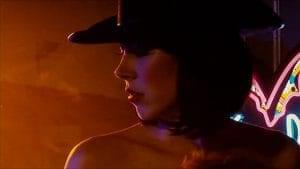
Despite its title, there’s nothing soulful or agonized about Underbelly Blues. Instead, it is a mosaic of degeneracy, made whole by an ensemble of violent eccentrics with mouths that you wouldn’t blow your mother a kiss with. As with all exploitation flicks born in the post-Tarantino universe, its antics, however entertaining, reek of imitation, but in this case, that seems to be the intention. At first glance, the film plays as a flat-out spoof of Tarantino’s work, particularly Pulp Fiction—samurai swords, black bob wigs and mysterious briefcases all make an appearance. The fact that Tony Tarantino, Quentin’s father, is a credited producer only muddies things further, but I assume anyone with money and that valuable surname would have sufficed.
The film opens—in earnest, at least, as there’s a cold open or two—with the famous rapper, Uforic (Jamar Neighbors), looking for cell service, holding his phone high in the air as he pirouettes around his broken-down car to “Dance of the Sugar Plum Fairy.” At this early point, the movie firmly stakes its freak flag in the territory of “live-action cartoon.” Before long, Uforic is picked up by a bespectacled southerner named York (Seamus Reed), not so much out of the kindness of the latter’s heart, but out of the cruelness of the jagged, moldy rock where his heart should be. After an argument over who gets to control the radio, York takes Uforic out into the desert and prepares to execute him, not over the argument but just for the fun of it. Before the deed is done, Unforic makes a last-minute appeal. It’s the ol’ “I know where there’s money, and I know how to get it” spiel. It works, of course, and the two head out to find a priceless briefcase, setting off a series of increasingly unwholesome events.

“…a mosaic of degeneracy…”
Among the offbeat characters, we meet by way of the briefcase, which is constantly changing hands, are an obsessive-compulsive baddie who takes dismemberment like a champ, a Rastafarian variation of Dr. John and an undynamic duo who prove that two heads aren’t necessarily better than one. At one point, the briefcase falls into the lap of a young man with an omnibus of mommy issues. When he begs his mother for some privacy, she replies, “you’re ashamed to whack off in front of me, all of sudden?” Lines like this one and the movie’s general sense of lawlessness are its biggest selling points. Where it fails to gain traction is in its mission statement.
It’s a losing battle to spoof something that’s already funny (there’s a reason self-effacement is a storied defense mechanism). If you remember, and I’m sure you do, Vincent Vega accidentally shoots Marvin in the face in Pulp Fiction. So, in Underbelly Blues, when two criminals are in a car, caught up in an amusingly overwritten conversation and one accidentally shoots himself in the leg, is that parody? If so, it’s badly misguided. If not, it’s essentially a reenactment. There’s a number of plot threads and isolated incidents in Underbelly Blues that suffer from the same predicament. It’s one thing to be inspired by a film or a particular director, but it’s another thing to simply be a cover band who makes a few variations every now and then.

“It’s a losing battle to spoof something that’s already funny.”
And that’s a shame, because, unoriginality aside, the film boasts a handful of memorable one-liners (“kids love polar bears; they’ll drink anything a polar bear drinks”), some clever sight gags and a cast that appears game for anything. If only Phil Messerer and Seamus Reed, the director, and writer, had taken their anarchic sensibilities and applied them to a world all their own. That’s something I would like to see.
Underbelly Blues (2011) Directed by Phil Messerer. Written by Seamus Reed. Starring Seamus Reed, Andrew Green, Jamar Neighbors, Emilee Wilson, Marc Hatchell, Zane Helberg, Elizabeth Croydon, Ant Dub, Nathan Hurd, Colton Kowalsky, Munch, Ben Stranahan, Sax Carr, P.J. Stansbury, Chris Cronin.
2 out of 4

